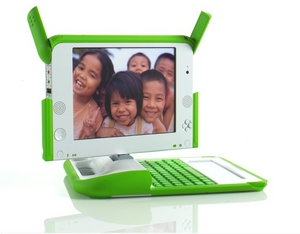Wiki-ul OLPC
| Traducerea The OLPC Wiki | original |
| english | عربي | پښتو | български | deutsch | español | français | kreyòl ayisyen | italiano | 日本語 | 한국어 | монгол | Bahasa Melayu | नेपाली | norsk | português | română | русский | kinyarwanda | türkçe | 中文 | 繁體中文 +/- | diferenţe |
Bun venit pe wikiul OLPC, casa saitului colaborativ despre proiectul „Un laptop pentru fiecare copil” (OLPC) şi proiectele şi comunităţile legate de acesta. Avem până acum 9,909 pagini şi peste o mie de colaboratori înregistraţi; vă invităm să vă alăturaţi şi să împărţiţi cu noi ideile voastre.
Ce e nou
- Ultima lansare: O construcţie stabilă şi nouă din nou, Build 385, însoţită de o lansare a unui nou firmware, Q2B87, sunt acum disponibile. Vă rugăm actualizaţi-vă maşinile—veţi găsi multe îmbunătăţiri în aproape toate funcţiile sistemului (Note asupra ediţiei).
- Localizare: Traducerea în spaniolă a www.laptop.org este acum pe linie, mulţumită eforturilor neobositului Xavier Alvarez. Modelele pentru adăugarea altor limbi pot fi găsite la Localization/www.laptop.org. Traducerea în chineză simplificată este de asemenea pe linie, mulţumită lui Paulo Drummond; şi traducerea coreeană, mulţumită lui Do Young-Min, 도 영민.
- B2 machines are being distributed to developers who have joined the Developers Program. Those without machines can still run emulators on their current computers. If you have a machine, please see the BTest-2 Release Notes and B1 and B2 Demo Notes. B1 Release Notes can still be found here.
- The specification for our security platform, Bitfrost, has been released. Comments invited.
- OLPC wins Popular Science's Best of What's New 2006. The One Laptop per Child (OLPC) website has a new look, thanks to the efforts of Nurun and Pentagram.
- Rwanda commits to the "One Laptop per Child" initiative. Uruguay also announced its participation in the OLPC project. Previously, IDB and OLPC formalized an agreement aimed at support mainstreaming of new approaches to digital technology in Latin American and Caribbean education.
Weekly updates can be found in Current events.
Despre „Un laptop pentru fiecare copil”
- E un proiect educativ, nu un proiect de laptop.
Acesta este wikiul pentru asociaţia One Laptop per Child (Un laptop pentru fiecare copil). Misiunea acestei asociaţii non-profit este dezvoltarea unui laptop cu un cost redus «laptopul de 100$», o tehnologie ce ar putea revoluţiona felul în care educăm copii lumii. Ţelul nostru este să oferim copiilor din întreaga lume oportunităţi de a explora, experimenta şi a se exprima.
De ce au nevoie de laptopuri copii din ţările în curs de dezvoltare? Laptopurile sunt atât o fereastră cât şi o unealtă: o fereastră spre lume şi o unealtă pentru gândire. Ele oferă tuturor copiilor o cale minunată de a învăţa prin interacţiune independentă şi explorare.
OLPC espouses five core principles: (1) child ownership; (2) low ages; (3) saturation; (4) connection; and (5) free and open source.
More on the Laptop and OLPC's vision for learning.
What you'll find inside
A good place to start exploring this wiki is the One Laptop per Child page, which gives an overview of the project. There is a list of frequently asked questions (FAQ); a place to ask a question; and numerous pages on hardware, software, content, and the developers program—and a separate wiki for software development. Sugar is a novel interface with its own interface guidelines. There are also discussion pages on issues of deployment and country-specific discussions. An extended table of contents is also available. The latest build is always available here. The latest stable build is always available here.
About this wiki
The purpose of this wiki is to both share information about the project and to solicit ideas and feedback. The articles and discussion vary from technical to epistemological. We invite comments on every page (please use the "discussion" tab at the top of each page). Please restrict edits to the article pages themselves to facts, not opinions. You are encouraged to sign your work and to make liberal use of citations and links. (Please make an account and please use ~~~~ as a signature for your comments.) Please note that pages that include the {{OLPC}} template—such as this one—are maintained by the OLPC team and are generally representative of the current state of the project. Other pages—created and maintained by the public—should be read with that in mind.
